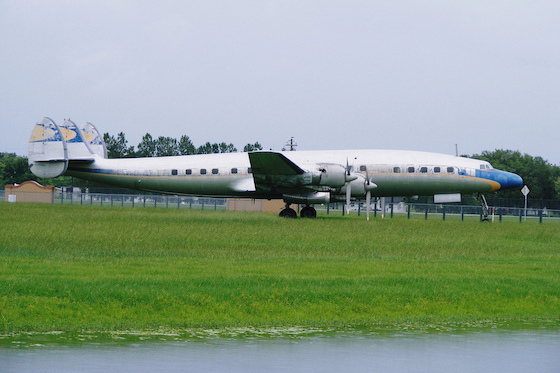Will they serve drinks in tiny bottles? It makes perfect sense that the futuristic TWA Hotel at JFK airport in New York City, designed by Eero Saarinen, would have an equally memorable bar and restaurant: the fuselage of a 60-year-old Lockheed Constellation L-1649 Starliner. It was trucked, sans wings, from Maine recently after undergoing refurbishment (the directive: “Make it look like 1958”). The “Connie,” still sporting its Trans World Airlines logo, will join the hotel, which opens in December, next spring. —Barbara Bohn

What Sears got wrong: Sears Holdings, once the biggest retailer in the country, is on the verge of filing for bankruptcy after 125 years. It’s a good reminder that size doesn’t necessarily equate to safety and a failure to keep up with the times and rebrand successfully can lead to implosion, even for a giant. CNBC breaks down the 5 things Sears got wrong, including diversifying too much. Click here for the other four. —Chloe Riley
Advantage, brand: With a female business travel survey revealing 83% of women reporting one or more safety-related concern or incident during business travel, it reinforces an opportunity for trusted hotel brands to market their safety benefits. The survey by Global Business Travel Association (GBTA), in partnership with AIG Travel, revealed the precautions female business travelers take to mitigate potential safety risks. For example, among the results, 86% of respondents change travel booking behavior, such as booking only daytime flights or a central lodging location, while 70% said they will choose a traditional hotel. When booking a traditional hotel, the results showed that 74% of women book at trusted hotel chains, 67% considered the safety of the neighborhood and 64% look for hotels close to their work site. Sounds like an opportunity to me. —Jeff Weinstein
Lawyers, guns and money: The New York Times takes a fascinating – and disturbing – look at what happens to survivors in the aftermath of a mass shooting. With the legal battles that inevitably follow, many find themselves pawns in money-grabbing marketing efforts by their representation. “They wanted me to share my history, but get more clients,” said one survivor of the 2016 Pulse nightclub shooting in Florida. Others get sent on cross-country trips, making appearances and promotional videos. —B.B.
Dreamers: The “Autonomous Travel Suite” has won the 2018 Radical Innovation Award, which integrates transportation and hospitality through a driver-less, mobile suite offering door-to-door transportation service in between the traveler’s home and destination. Within a compact hotel room environment, the suite is equipped with basic sleeping, working and washroom functions, allowing the guests use their travel time more efficiently and productively. The Travel Suites are designed to be a room operated by professional hospitality services providing full coverage during the travel. What are the chances of this becoming a part of our future? —J.W.
Travel apps for the affluent Chinese: High-end travel app booking experienced a boom in early 2012 amid the government’s anti-corruption campaign, writes Jing Daily, and many businesses seized the potential of yet another luxury market that focused more on experiences than things. But the competition in this space has been fierce, as online itineraries can be easily copied by competitors. Many have sought to diversify their offerings with technology (e.g., WeChat mini-program, VR) innovation and customizable trips. This new class of Chinese traveler is changing both how destinations welcome tourists, but also how domestic travel apps cater to this most profitable demographic. Take a look. —C.R.
